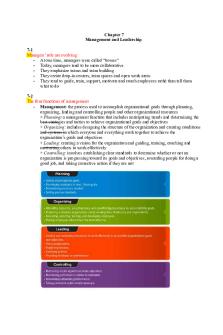Chapter 15 - Understanding Business PDF

| Title | Chapter 15 - Understanding Business |
|---|---|
| Course | Foundations Of Business I |
| Institution | Drexel University |
| Pages | 2 |
| File Size | 164 KB |
| File Type | |
| Total Downloads | 49 |
| Total Views | 158 |
Summary
This is the summary for the materials from chapter 15 in book, including main contents and key words definition....
Description
Chapter 15 Distributing Products 15-1 The emergence of marketing intermediaries - Marketing intermediaries: organizations that assist in moving goods and services from producers to businesses (B2B) and from businesses to consumers (B2C) - Channel of distribution: a whole set of market of marketing intermediaries, such as agents, brokers, wholesalers, and retailers, that join together to transport and store goods in their path (or channel) from producers to consumers - Agents/brokers: marketing intermediaries who bring buyers and sellers together and assist in negotiating an exchange but don’t take title to the goods - Wholesaler: a market intermediary that sell to other organizations - Retailer: an organization that sells to ultimate consumers *Why marketing needs intermediaries - Intermediaries perform certain marketing tasks – such as transporting, storing, selling, advertising and relationship building – faster and cheaper than most manufacturers could 15-2 The utilities created by intermediaries - Utility: in economics, is the want-satisfying ability, or value, that organizations add to goods or services by making them more useful or accessible to consumers than they were before *Form utility - Changing raw materials into useful products *Time utility - Adding value to the products by making them available when they’re needed *Place utility - Adding value to the product by having them where people need *Possession utility - Doing whatever is necessary to transfer ownership from one party to another, including providing credit, delivery, installation, guarantees, and follow up service *Information utility - Adding value to products by opening two-way flows of information between marketing participants *Service utility - Adding value by providing fast, friendly service during and after the sale and by teaching customers how to best use products overtime
15-3 Wholesale intermediaries *Merchant wholesalers - Merchant wholesalers: independently owned firms that take title to the goods they handle - Rack jobbers: wholesalers furnish racks or shelves full of merchandise to retailers, display products, and sell on consignment - Cash-and-carry wholesalers: wholesalers that serve mostly smaller retailers with a limited assortment of products - Drop shippers: wholesalers that solicit orders from retailers and other wholesalers and have the merchandise shipped directly from a producer to a buyer *Agents and brokers - They do not carry inventory, provide credit or assumer risks 15-4
*Retail distribution strategy - Intensive distribution: distribution that put products into as many retail outlets as possible - Selective distribution: distribution that sends products to only a preferred group of retailers in an area - Exclusive distribution: Distribution that sends products to only one retail outlet in a given geographic area...
Similar Free PDFs

Understanding business
- 11 Pages

Chapter-15 - chapter 15
- 18 Pages
Popular Institutions
- Tinajero National High School - Annex
- Politeknik Caltex Riau
- Yokohama City University
- SGT University
- University of Al-Qadisiyah
- Divine Word College of Vigan
- Techniek College Rotterdam
- Universidade de Santiago
- Universiti Teknologi MARA Cawangan Johor Kampus Pasir Gudang
- Poltekkes Kemenkes Yogyakarta
- Baguio City National High School
- Colegio san marcos
- preparatoria uno
- Centro de Bachillerato Tecnológico Industrial y de Servicios No. 107
- Dalian Maritime University
- Quang Trung Secondary School
- Colegio Tecnológico en Informática
- Corporación Regional de Educación Superior
- Grupo CEDVA
- Dar Al Uloom University
- Centro de Estudios Preuniversitarios de la Universidad Nacional de Ingeniería
- 上智大学
- Aakash International School, Nuna Majara
- San Felipe Neri Catholic School
- Kang Chiao International School - New Taipei City
- Misamis Occidental National High School
- Institución Educativa Escuela Normal Juan Ladrilleros
- Kolehiyo ng Pantukan
- Batanes State College
- Instituto Continental
- Sekolah Menengah Kejuruan Kesehatan Kaltara (Tarakan)
- Colegio de La Inmaculada Concepcion - Cebu













